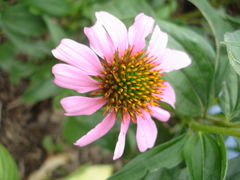Echinacea tennesseensis: Difference between revisions
No edit summary |
No edit summary |
||
| (3 intermediate revisions by one other user not shown) | |||
| Line 12: | Line 12: | ||
|exposure=sun | |exposure=sun | ||
|water=moderate, dry | |water=moderate, dry | ||
|features=flowers, bees, cut flowers, drought tolerant | |features=flowers, bees, cut flowers, butterflys, drought tolerant | ||
|flower_season=early summer, mid summer, late summer, early fall | |flower_season=early summer, mid summer, late summer, early fall | ||
|flowers=purple | |flowers=purple | ||
| Line 18: | Line 18: | ||
|min_zone=3 | |min_zone=3 | ||
|max_zone=8 | |max_zone=8 | ||
|image= | |image=Echinacea tennesseensis.jpg | ||
|image_width=240 | |image_width=240 | ||
}} | }} | ||
'''''Echinacea tennesseensis''''' ('''Tennessee coneflower''') is a [[flowering plant]] in the family [[Asteraceae]], [[endemic (ecology)|endemic]] to the [[cedar glades]] of the central portion of the [[U.S. state]] of [[Tennessee]]. It is also known as the Tennessee purple coneflower. It is a [[herbaceous]] [[perennial plant]] growing to 75 cm tall. The [[leaf|leaves]] are hairy, lanceolate, and arranged in a basal whorl with only a few small leaves on the flower stems. The [[flower]]s are produced in a [[inflorescence|capitulum]] (flowerhead) up to 8 cm broad, with a ring of purple ray [[flowers|florets]] surrounding the brown disc florets. | |||
==Cultivation== | ==Cultivation== | ||
| Line 27: | Line 27: | ||
===Propagation=== | ===Propagation=== | ||
Seeds are placed in cold moist stratification. Germination occurs at 20D/10N C alternating temperature cycle. Germination was greater in light than dark. | |||
Seeds are placed in cold moist stratification. Germination occurs at 20D/10N C alternating temperature cycle. Germination was greater in light than dark. | |||
===Pests and diseases=== | ===Pests and diseases=== | ||
Japanese Beetles | Japanese Beetles, Thrips | ||
Thrips | |||
==Species== | ==Species== | ||
Latest revision as of 15:28, 24 October 2009
| Echinacea tennesseensis subsp. var. | Tennessee Purple Coneflower | |||||||||||||||||||||||||||||||||||||||||||||||||||||||
|---|---|---|---|---|---|---|---|---|---|---|---|---|---|---|---|---|---|---|---|---|---|---|---|---|---|---|---|---|---|---|---|---|---|---|---|---|---|---|---|---|---|---|---|---|---|---|---|---|---|---|---|---|---|---|---|---|

|
|
| ||||||||||||||||||||||||||||||||||||||||||||||||||||||
| ||||||||||||||||||||||||||||||||||||||||||||||||||||||||
Echinacea tennesseensis (Tennessee coneflower) is a flowering plant in the family Asteraceae, endemic to the cedar glades of the central portion of the U.S. state of Tennessee. It is also known as the Tennessee purple coneflower. It is a herbaceous perennial plant growing to 75 cm tall. The leaves are hairy, lanceolate, and arranged in a basal whorl with only a few small leaves on the flower stems. The flowers are produced in a capitulum (flowerhead) up to 8 cm broad, with a ring of purple ray florets surrounding the brown disc florets.
Cultivation
Propagation
Seeds are placed in cold moist stratification. Germination occurs at 20D/10N C alternating temperature cycle. Germination was greater in light than dark.
Pests and diseases
Japanese Beetles, Thrips
Species
Gallery
If you have a photo of this plant, please upload it! Plus, there may be other photos available for you to add.
-
photo 1
-
photo 2
-
photo 3
References
- Standard Cyclopedia of Horticulture, by L. H. Bailey, MacMillan Co., 1963
External links
- w:Echinacea tennesseensis. Some of the material on this page may be from Wikipedia, under the Creative Commons license.
- Echinacea tennesseensis QR Code (Size 50, 100, 200, 500)
